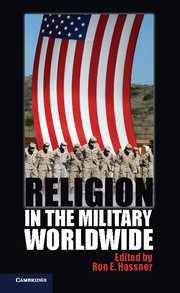Book contents
- Frontmatter
- Contents
- List of contributors
- Introduction
- Part I Rituals, Beliefs, and Practices
- Part II Religious Demographics in the Armed Forces
- Part III Religion and Military Operations
- Part IV Constitutional Challenges
- 8 United States I
- 9 United States II
- 10 Turkey
- Conclusion
- Contributor Biographies
- Index
- References
9 - United States II
Published online by Cambridge University Press: 05 June 2014
- Frontmatter
- Contents
- List of contributors
- Introduction
- Part I Rituals, Beliefs, and Practices
- Part II Religious Demographics in the Armed Forces
- Part III Religion and Military Operations
- Part IV Constitutional Challenges
- 8 United States I
- 9 United States II
- 10 Turkey
- Conclusion
- Contributor Biographies
- Index
- References
Summary
The terrorist attacks of September 11, 2001, brought religious issues into the public forum. Questions about the religious composition of the U.S. military and its influence on foreign and defense policy were not new, but they reemerged with renewed vigor. Prior to that time, it was assumed that religious faith and identity, whether within the U.S. military or in the military services of allies and enemies, was a matter of personal choice and did not significantly influence international security. Because the Department of Defense (DOD) was often the most visible tool of U.S. foreign and defense policy, many questioned the role of religion in the DOD and the extent to which religious factors influenced policy and practice.
The Department of Defense was unprepared to deal with religion as a cause or contributor to warfare, as were the Department of State, the Department of Justice, and the Department of Homeland Security. Uncertainty within the DOD about how to respond to this new environment reflected an inability to understand how religion factored into modern warfare rather than an inability to understand the religiosity of military personnel. Regarding the emotive reaction of individuals, the DOD tried to ignore the “religious factor” both within its ranks and as a variable shaping the battlefield. Despite the immediacy of the problem, the U.S. government and the U.S. military continued to address the issue of religion in conflict, war, and terrorism in an ad hoc, haphazard, and superficial manner. This approach reflected long-standing and reasonably successful DOD policies toward the department’s own internal religious pluralism and diversity. It did not contribute to an understanding of how religion influenced the emerging conflict and war in the Middle East.
- Type
- Chapter
- Information
- Religion in the Military Worldwide , pp. 196 - 207Publisher: Cambridge University PressPrint publication year: 2013
References
- 1
- Cited by



